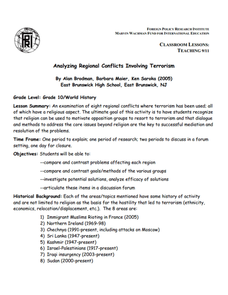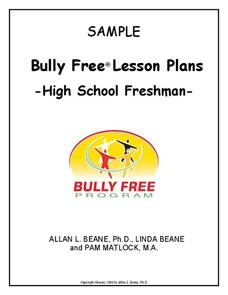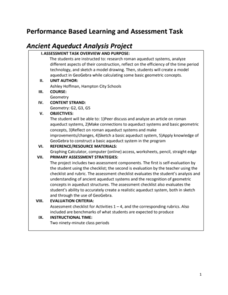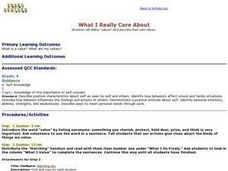Curated OER
Respect: Looks Like, Sounds Like, Feels Like
Sixth graders participate in a question and answer discussion on respect and then complete the "Planning to Use Respect" activity sheet. They describe the senses of a stuffed animal to their peers and assess how respect looks, sounds and...
Foreign Policy Research Institute
Analyzing Regional Conflicts Involving Terrorism
This is a week-long lesson on analyzing the similarities and differences between sources of tension and terrorism in eight locations around the world. The class is divided into eight groups and assigned one of the locations to research....
Curated OER
Analyzing the Language of Presidential Debates
Scholars assess how word choice and linguistic patterns affect a presidential debate. They examine candidates' words for repetition and analyze what this repetition means. Then they locate countries that fit the expression free world. In...
Curated OER
We Can't Decide
Second graders investigate decision making skills that they can apply on a daily basis. In this decision making lesson, 2nd graders listen to a read aloud of Pinocchio and make a list of times when decisions have to be made. They access...
Curated OER
Ornaments for Nursing Home Tree
Young scholars participate in an activity that will allow them to create a gift for a nursing home patient and give their gift to someone who needs a caring hand. In this community service activity, students learn compassion, and also...
Curated OER
Number Operations
Inject fun into your math review! Pupils review basic math operations with decimals as well as addition and subtraction with simple fractions. In this number operations lesson, students work in groups to create a game for the math skill...
Curated OER
Exaggerated Poetry
Students use physical poses and vocal choices to create emphasis in communication. In this exaggerated Poetry lesson, students use physical movement and vocal choices to exaggerate an expression make a connection between literary content...
Curated OER
The Life and Work of Vincent Van Gogh
Vincent Van Gogh is a fascinating subject for students of art history.
Utah Education Network (UEN)
Values
Being self-aware of personal wants, needs, and values is a big part of growing up. Here, you'll find seven different teaching options and two different introductions to a lesson on getting learners to think about their personal values....
Bully Free Systems
Bully Free Lesson Plans—Ninth Grade
"Bullying and Prejudice" and "Do You Cyber Bully," two lessons from a complete Bully Free program, serve as samples of the approach used in a unit designed to bring awareness to and to combat bullying. Each lesson asks class members to...
Bully Free Systems
Bully Free Lesson Plans—12th Grade
Two sample lessons from a curriculum unit on bullying provide high school seniors with an opportunity to assess their online and cell phone behavior and to consider how they can offer support to bullied students. Each plan includes an...
Science Matters
Plot Study
Small groups investigate plots of land to discover how abiotic and biotic factors interact. After recording their findings, scholars share observations with peers and self-reflect on the learning process.
Radford University
Ancient Aqueduct Analysis Project
Let the class' knowledge of geometry flow like water in an aqueduct. Future mathematicians research ancient Roman aqueducts and consider the geometric concepts necessary in their construction. They then use GeoGebra to create models of...
Radford University
A Day at the Beach!
Make math class feel like a day at the beach (minus all the sunburns, of course). Given information about a pail, a soup can, and a plastic pyramid mold, pupils calculate the volume of sand that can fit in each. They then design sand...
Radford University
Modeling Statistical Data
Can people predict the number of future divorces? Scholars research and analyze data on the number of divorces and teenage pregnancies in Virginia over time. They use the data to create graphs, determine the best-fit equations, and make...
Radford University
Connecting Theoretical and Experimental Probability
Play some games, develop a law, and then call it a day. Learners first perform a small number of trials for a probability experiment, then predict the result for a larger number of trials. They then compile data from the entire class to...
Missouri Department of Elementary
What Does Respect Look Like at Home?
Individuals consider why is it important to respect family members as they complete a self-respect survey to assess their respectful behaviors at home. They then choose three items from the survey and write about how they plan to improve...
Curated OER
Making Choices
Fifth graders identify their personal interests and behavioral choices. They explore how these choices affect school and family situations. Consequences of their choices are examined.
Curated OER
I Can . . .
Third graders describe some of the things they can do and what they have improved on since last year.
Curated OER
What I Really Care About
Fourth graders explore the concept of values and apply it to what they think is important. Different situations are analyzed to see if their values are maintained.
Curated OER
Social Studies: All about Me
Students collect information about themselves and their favorite things. Each month they add information in the form of reflections demonstrating growth in self esteem and self evaluation. At the end of the sachool year, students...
Curated OER
Personal Body Types
Students are introduced to the four main body types. Individually, they label their own body type and disover which styles would be most flattering to their figure. To end the lesson plan, they design an outfit for themselves and...
Curated OER
Knock on Wood
Students discuss, in small groups, four situations provided and assess whether they believe the action done was right or wrong. They identify peer
pressure and how it influences young boys and to provide young boys with tools to resist...
Curated OER
All About Me
Third graders explore how everyone is different and have a certain way in which they learn best.

























